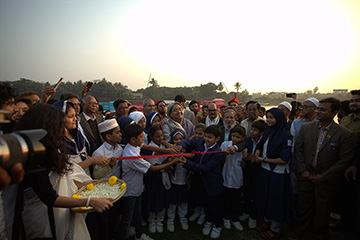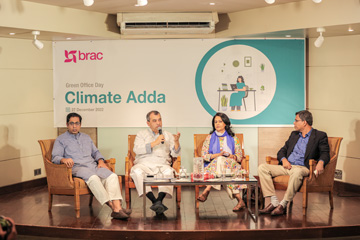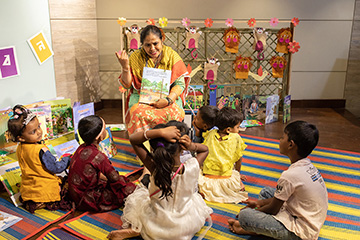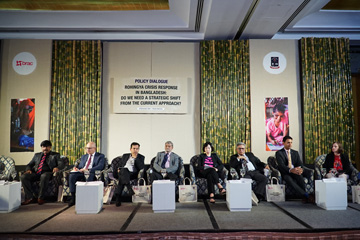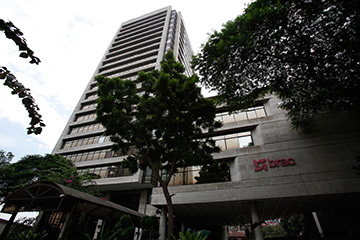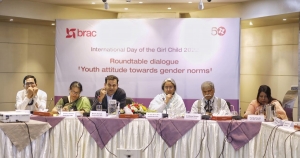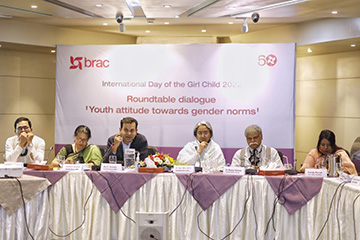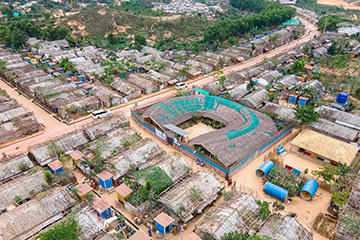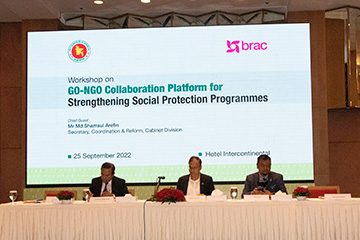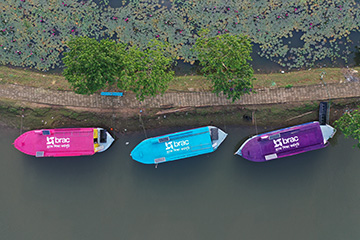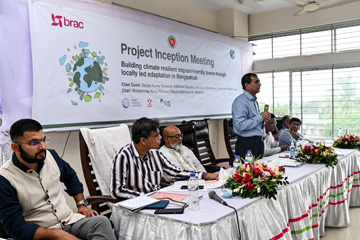
BRAC
BRAC fun learning boats for children inaugurated in Chandpur
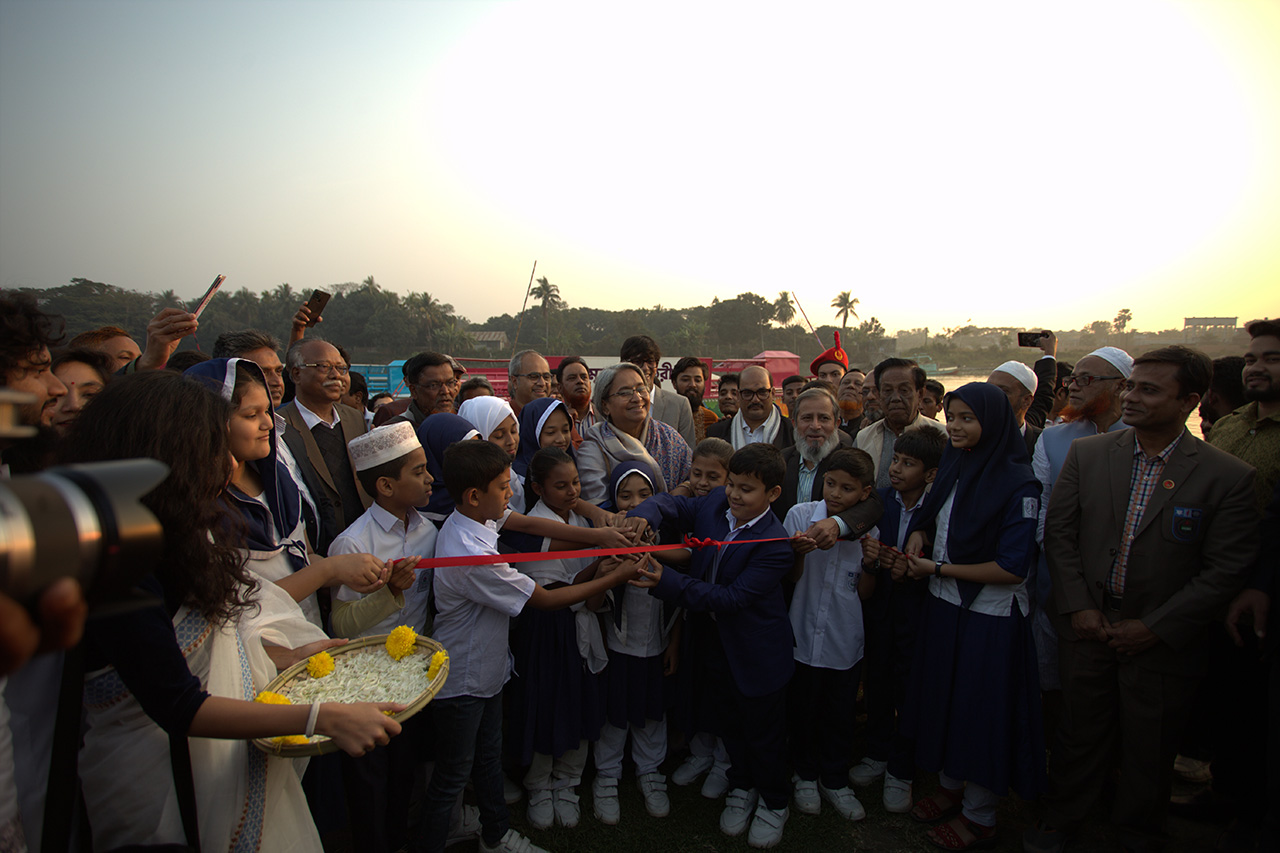
Children's play-based and experiential learning through floating boats now in Chandpur. Education Minister Dr. Dipu Moni inaugurated BRAC’s boat school on Friday, 27 January 2023 at Al-Amin Academy School and College in the city on the riverside.
At her speech as Chief Guest, Education Minister Dr. Dipu Moni said "Science and mathematics are very interesting subjects, they can be learned with great pleasure if we teach them with fun. If we don't, even the simplest subjects can become difficult. BRAC, on the occasion of its 50th anniversary, has transformed many boats into boat schools, using accessible materials such as pictures, animations, games to teach children of hard-to-reach areas science and mathematics. At the same time, children are learning the value of being humane, empathetic from the young age.
The basic philosophy of our new curriculum emphasises on the same. Children will not be afraid of examinations and will become persons with empathy and values. I believe our government's effort and BRAC's effort complement each other, which will take it further."
Safi Rahman Khan, Director, Education, Skills Development, and Migration, Profulla Chandra Barman, Programme Head, Education Programme along with BRAC head office and field staff were present at the programme.
Thematically designed around values, mathematics and science to celebrate the golden jubilee of BRAC, the three boats started their journey in September 2022 from the northeastern district of Sunamganj and will travel down to the coastal area of Bhola. The boats are making stopovers en route so that a wide range of children, students, teachers and people from the community can visit, and experience the travelling exhibits along with different activities. The duration of the stopovers are for 7-10 days, everyday from 10am-4pm. The boats draw volunteer teachers from the local communities to guide visitors. Special ramps have been designed for children with disabilities.
The educational activities and materials have been particularly designed for primary school children, although older students and visitors will also be able to experience the joy of learning. The visitors will be offered activities and contents on values, while maths and science subjects are designed with puzzles, hands-on experiments, problem solving with fun activities and games, and posters with short bios of great scientists and mathematicians.
The Values Boat was inspired by the philosophy of Sir Fazle Hasan Abed, founder of BRAC, who ensured that along with regular academic subjects, values education and performing fine arts were incorporated in BRAC schools.
All the boats are covered under CCTV surveillance and strictly follow BRAC’s safeguarding policies along with the health, safety and security guidelines.
BRAC introduced the concept of boat schools in the wetlands (haor regions) of north-eastern Bangladesh in 2011. The idea was to bring the classroom to the children who were disconnected from schools due to their homes being surrounded by water for most of the year. The Boat School project was selected as a “100 Global Inspiring Innovations of 2017” by HundrED, a Finnish global education non-profit organisation.
"Climate Adda" to raise awareness of environmental protection
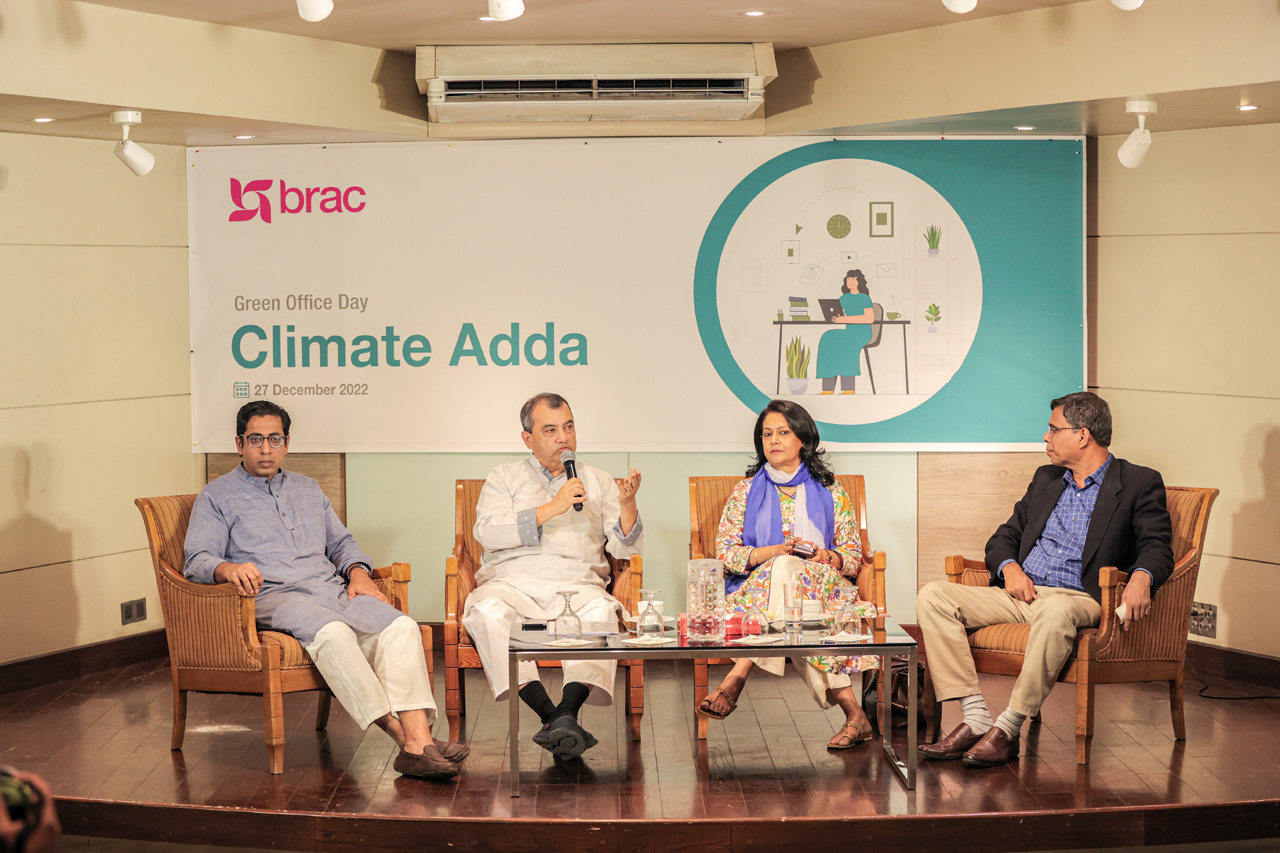
"Green Office Day" was celebrated at the BRAC Center of the capital on Tuesday, 27 December with the aim of reducing harmful carbon emissions and raising awareness of environmental protection. As part of this event, keeping in mind the theme of "Carbon Footprint Reduction" a "Climate Adda" was organised.
The organiser of the event says, the Adda was aiming to bring together in one discussion two essential ideas of “Moving towards a Carbon-Neutral World” and “Youth Engagement” as a pivotal stepping stone in taking our overall objective forward at BRAC which is to raise awareness on carbon footprint reduction and in contributing towards BRAC’s aim of becoming carbon-neutral in the near future.
“Climate Adda” mainly involves lively discussions to identify and acknowledge the problems at hand, which is the increasing carbon footprint leading to more global warming; how feasible and challenging are the solutions towards "Carbon-Neutrality"; and apart from this, how the steps can be taken to make a difference – were also discussed in detail.
Chairman of parliamentary standing committee on the Ministry of Environment, Forest and Climate Change Mr. Saber Hossain Chowdhury MP; Mr. Nahim Razzak MP; and Advocate Syeda Rizwana Hasan, Member, BRAC Governing Board and Executive Director, Bangladesh Environmental Lawyers Association (BELA) participated in the climate chat (Climate Adda). Dr. Md. Liakath Ali, Director of Climate Change Programme of BRAC and BRAC International moderated the discussion.
Mr. Saber Hossain Chowdhury said, “at this year's COP conference, we talked about an important gap. That is, lack of trust, faith. If developed countries do not keep their words, then we will not be able to move forward in any way towards the future. There is even no definition of what we mean by climate finance. Developed countries claim that they gave us $80 billion last year. However, according to the data of neutral organisations, it is not even $20 million.”
Mr. Nahim Razzaq says, “The carbon footprint is something we can all play a part in controlling. Be it in our home or outside home through behavioural changes. Unfortunately, we have yet to influence behavioural change. Especially those who are young need to be included in this process. National consensus and guidelines are needed.” He suggested adding climate change as a chapter in textbooks and curricula.
Advocate Syeda Rizwana Hasan said, “We have a lot to do from individual to social to state levels. We can emphasise on the use of public transport over the use of private transport. Then the role of the government should be to improve the public transport system. Bicycle lanes should be introduced to encourage the use of bicycles. Young people should come forward with proper leadership. To be able to be more climate-friendly we need to reduce consumption at personal and state levels. Youths have to raise questions on the safety of food and air.”
To sum up the discussion, Dr. Md. Liakath Ali said “BRAC has been at the forefront of reducing the organisation’s carbon footprint. One of the major initiatives successfully taken up in recent times has been the ban on single-use plastic within the organisation. In addition, we also discontinue the unnecessary use of items made of plastic including communication materials, encouraging paperless communication, and other climate-friendly energy resources, in an endeavour to save our forests — and, our planet.”
In the discussion, guest speakers talk about the global perspective on climate change, the role of the current government and the role of BRAC in this regard. How to engage our young generation, how they can play a more active role in the goal of building a carbon-free world, were discussed.
At the end of the discussion, members of the Popular Theatre, Social Empowerment and Legal Protection (SELP) Programme of BRAC performed Gombhira, a type of song originating in northwestern Bangladesh. BRAC officials, members of BRAC Youth Platform, and alumni of the Aamra Notun Network (ANN) under the BRAC Youth Platform participated in the programme.
“Build a world of play” campaign celebrates Play Labs
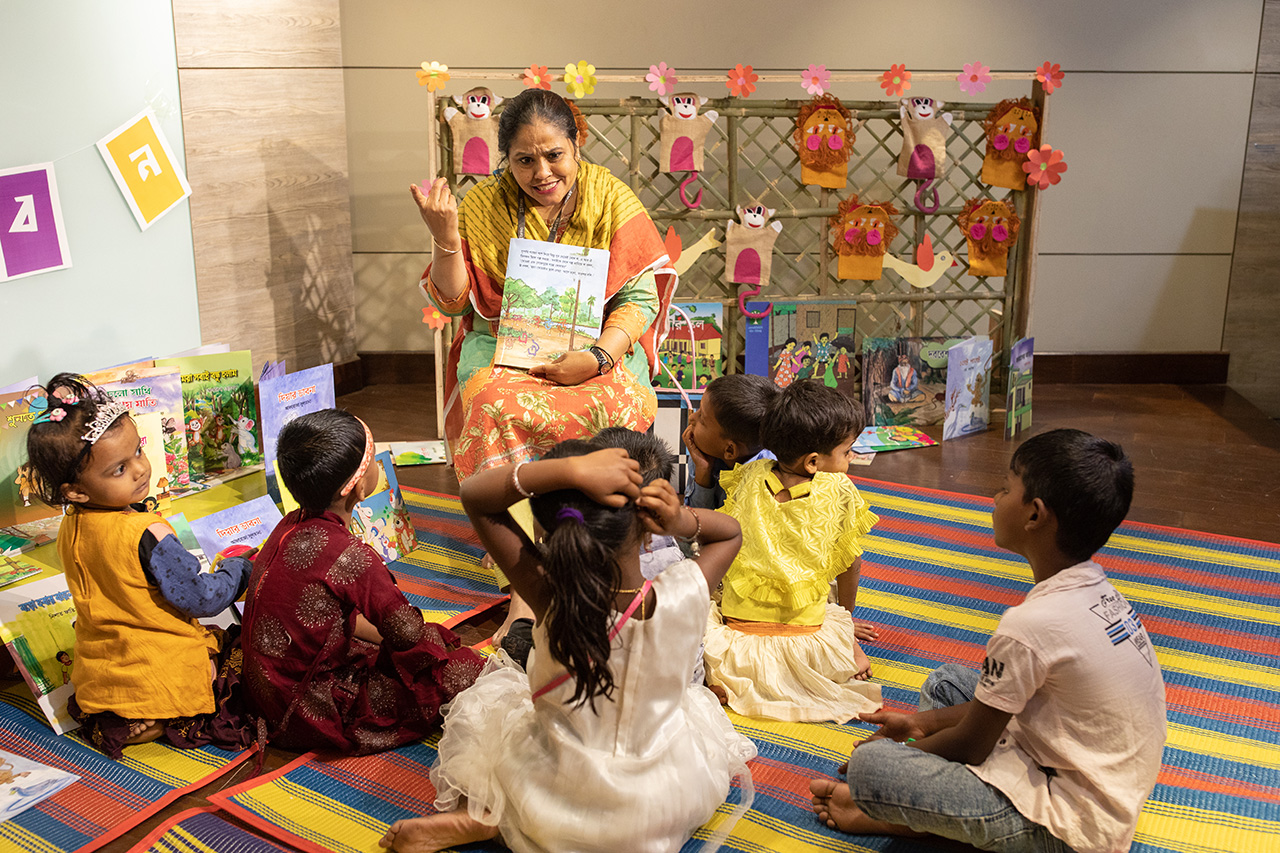
BRAC Centre at the capital’s Mohakhali went festive with children cheering and enjoying themselves doing a range of creative activities today on Wednesday, 7 December. They came with their parents and caregivers at a programme organised to celebrate the “BRAC Play Lab” model. BRAC Institute of Educational Development (BRAC IED), which developed this innovative model, organised the event as a part of celebrating 50th anniversary of BRAC, and 90th anniversary of LEGO Foundation – BRAC’s funding partner.
One of the largest development organisations of the world, BRAC, has established and supported its partners to establish play labs following the “BRAC Play Lab Model” so far in Bangladesh, Tanzania and Uganda. This model has been developed with funding from the Denmark-based child development organisation LEGO Foundation.
The children participated in diverse plays in the event, such as, making clay objects, drawing, learning through pictures, muppets, and word and number games. The event also showcased a research-based display of a range of traditional plays and games of Bengali and ethnic minority communities of Bangladesh.
The event was attended among others, by social media influencers of the country, cartoonists and artists Morshed Mishu, Syed Rashad Imam Tanmoy and Masuda Khan and magician Asif Asgar. They spent time with the children and participated in many activities.
Dr Erum Mariam, executive director, BRAC IED, and Kristine Morch, senior programme analyst, LEGO Foundation, were also present at the programme.
The Play Lab Model assists usually 1-5 years old children to learn through diverse play-based activities. The BRAC Play Lab model is particularly community-based, of high quality and cost-effective, so that joyful learning opportunities can be created for children with socioeconomically constrained situations. This model follows a play-based curriculum, for developing social-emotional learning, self-regulation, language, playfulness, creativity, empathy and problem-solving skills in children. The play labs are facilitated by “play leaders” who are local adolescent girls and young women and extensively trained in their facilitators’ role.
Apart from BRAC operated Play Labs, the organisation has provided technical assistance to the Bangladesh government to establish 400 Play Lab centres in 32 upazilas (sub-districts) of nine districts with over 25 thousand children participating. On the other hand, BRAC is running 656 play lab centres in Bangladesh, Tanzania and Uganda involving around 11,500 children.
BRAC has also developed an especially designed “humanitarian play lab” model for children in humanitarian emergency settings in conflict or post-conflict zones. This model is currently being implemented in the camps of Rohingya refugees in Cox’s Bazar district. BRAC is also operating such context and culture specific play labs in Uganda for children from refugee families taken shelter from neighbouring countries.
The humanitarian play lab model explores the therapeutic dimensions of play to foster resilience and healing process among the survivor children. The humanitarian play labs provide the Rohingya children with a space to play and express their emotions freely which, in turn, helps them feel safe. The design of these play labs reflect Rohingya culture and nurture children's spontaneity.
A global survey has found that 84% children want their parents to spend more time playing with them. Specialists observe that learning through play is a critical component in early childhood development and education. The BRAC Play Labs are built in a cost-effective process with locally available resources and reusable materials reflecting the local culture and language, and socio-economic and geographic contexts. Local community and parents are closely involved in the play lab centre operation.
The LEGO Foundation launched the #BuildaWorldofPlay campaign early this year on the occasion of its 90th founding anniversary. BRAC, as its partner, has joined the campaign, also as a part of its 50th anniversary celebration, in Bangladesh, Uganda and Tanzania focusing on the local context.
Policy dialogue held on Rohingya crisis response
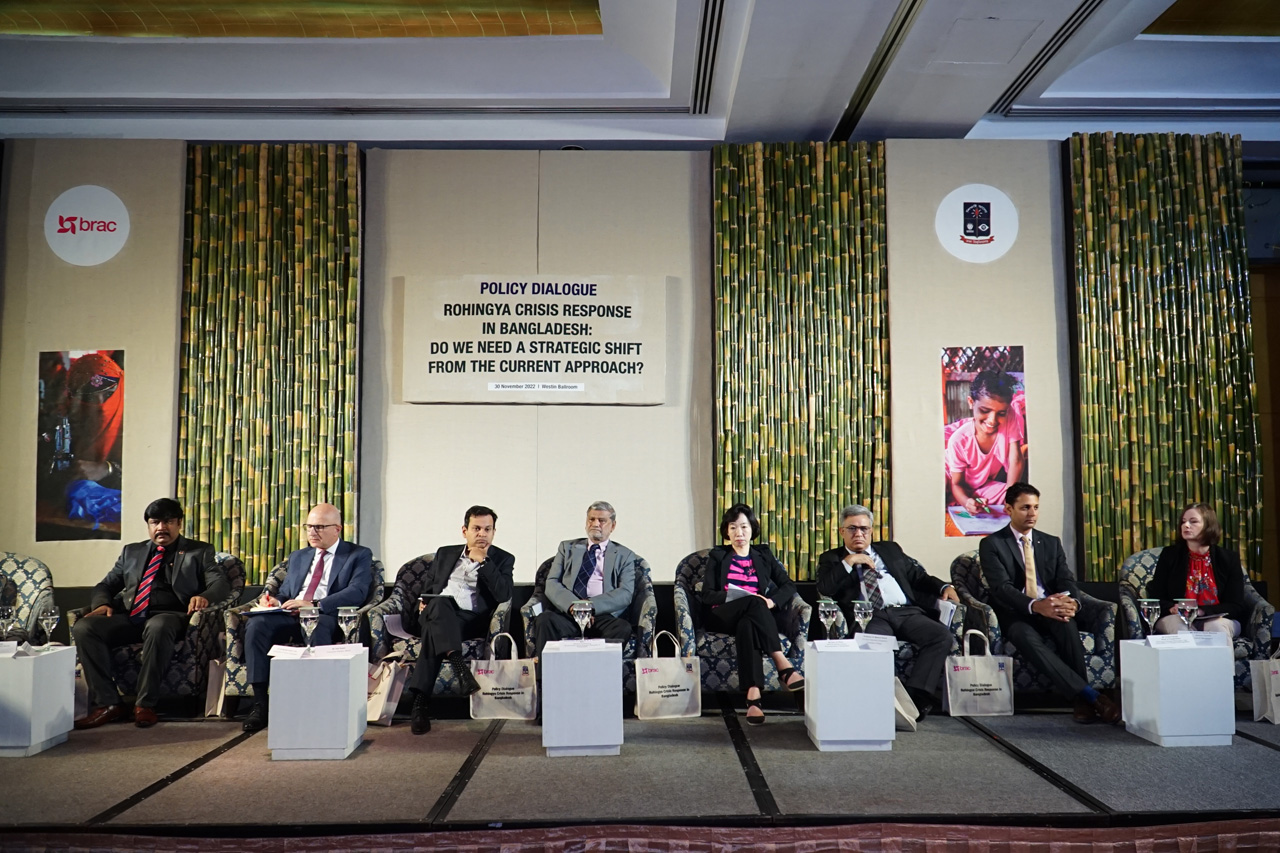
‘Time to opt for skill development approach to meet emerging needs of Rohingyas’
Since five years have elapsed, repatriation is still hanging in limbo, and the flow of funds is more fragile than before, it is time to focus on making a strategic shift towards skills development approach for the Rohingyas sheltered in the camps.
Speakers at a policy dialogue titled: “Rohingya Crisis Response in Bangladesh: Do we need a strategic shift from the current approach?” came up with the observations on 30 November 2022. BRAC and the Department of Development Studies, University of Dhaka jointly organised the dialogue at a local hotel.
Since the beginning of the Rohingya influx in 2017, the responding agencies have prioritised providing lifesaving assistance to the Forcibly Displaced Myanmar Nationals (FDMNs).
Several other issues such as the Russia-Ukraine war, humanitarian crisis in Afghanistan, and the ongoing global economic crisis appeared as bigger global concerns in the meantime. The prolonged nature of the crisis also tightened the flow of humanitarian assistance from donors and international agencies.
Four idea papers developed by the Department of Development Studies, University of Dhaka were presented at the dialogue that explored the changing needs of the refugees, potential livelihood mediums for them in 2023 and beyond, and roles of local, national and international NGOs in addressing these issues as well as map new sources of finance.
Citing the papers, speakers stressed on paying attention to the needs of the host communities. Addressing their insecurities would strengthen the host-Rohingya relationship; thus paving the way for determining strategic response, they said.
Honourable Planning Minister Mr. M A Mannan MP graced the opening session as the chief guest. He said, “Unfortunately, we have no direct control over the Myanmar issue. The Government of Bangladesh did whatever was possible on its part. However, Myanmar’s position is still unclear. With help from NGOs, development partners, and UN agencies, we have been able to reach a point to meet the basic requirements of the Rohingyas but it is not enough. We need to reach a consensus with our neighbours and the international community. The government will continue its attempts to repatriate the Rohingyas.”
Ms So-Jin Rhee, UNHCR interim Country Representative in Bangladesh, said, “The solution lies in Myanmar. But in the meantime, we have to bridge the gap. We are in a protracted situation. As a UN agency, we have to look at this strategically. Going into sixth year, funding is dwindling. At this juncture, we need to look into how to ensure the minimum like protection, health, WASH, food. We need to invest in resilience, education, skills development so that the Rohingya refugees become productive members of society.”
H.E. Mr Mustafa Osman Turan, Ambassador of Turkey to Bangladesh, said, “Turkey is best placed to understand the situation in Bangladesh as we are hosting the highest numbers of refugees in the world, which is nearly 4 million. We really appreciate the compassion and generosity that was shown by Bangladesh when the Rohingyas had to flee several times and significantly in 2017. We stood by Bangladesh and have been providing support in many different ways including a field hospital, which is treating 1,500 patients every day, free of charge. I would like to congratulate BRAC and Dhaka University for digging deeper into this very complex problem. I am looking forward to the outcomes. Turkey will continue to support Bangladesh until Rohingyas are repatriated.”
Asif Saleh, Executive Director of BRAC, said: “We should now look for a mid-term strategy for the refugees as we continuously advocate for their safe and dignified return to their homeland. There is a growing consensus within the sector that the current work needs to shift towards a development-like approach from a very short-term humanitarian crisis-focused approach. The only solution for the Rohingya refugees is their sustainable and voluntary repatriation to Myanmar.”
Ms Kathryn Davis Stevens, Mission Director, USAID Bangladesh, said, “We need to focus on market based solutions so that the Rohigyas can return to a prosperous future in Myanmar. At the same time, we must educate and ensure essentials for the host communities; going beyond the humanitarian response. Today I would like to stress on livelihoods, educational opportunities, security, stable economic opportunities to guard against dehumanisation of Rohingyas. Our total assistance in response to the Rohingya refugee crisis reached nearly $1.9 billion since August 2017. USAID will continue to provide support to the Rohingya crisis.”
Vivek Prakash, Head of Cooperation, Rohingya Refugee Response, High Commission of Canada to Bangladesh, said, "Canada has been the development partner of Bangladesh since its independence. The Rohingya crisis has moved past the emergency response to a more protracted nature. We are also continuing to mount pressure on the government of Myanmar. Canada continues to provide essential services to the Rohigya community; a key support is LPG gas that is helping in protecting the environment. It is important to maintain social cohesion among the Rohingyas and host communities so that the host community does not feel left behind. But it’s important not to forget this is a humanitarian crisis and in Bangladesh, the Rohingyas have limited opportunity to work so the financial implication is high.
In his concluding remarks the Chair of the Session Dr Imtiaz Ahmed, Professor of International Relations, University of Dhaka said, “To make it all inclusive it would have been better if the research considered voices of the Rohingya population as well.”
It may be mentioned, the government of Bangladesh has been striving to expedite the repatriation of about 1.2 million Rohingyas sheltered in Cox's Bazar and Bhasan Char. However, no significant response is yet perceptible from the Myanmar side.
Using environment-friendly materials: BRAC policy implementation stepped up
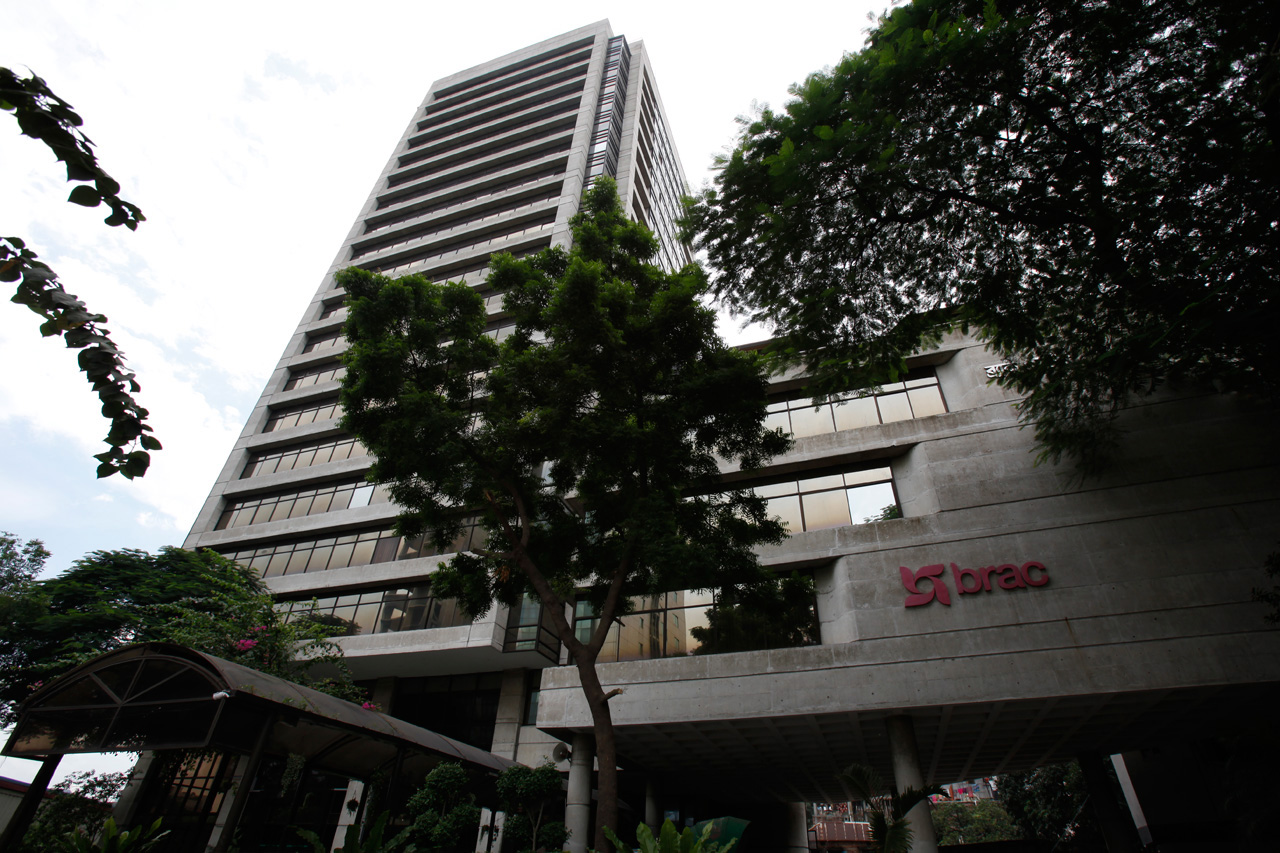
BRAC has stepped up the implementation of its policy to use environment-friendly materials. The organisation now stops using PVC banners and all other one-time campaign materials made of plastics as part of its environ-friendly policy.
A memo signed by Asif Saleh, executive director, BRAC Bangladesh, was circulated internally for all its staff. The policy will be in effect from tomorrow Monday, 1 November 2022.
This initiative is a part of the organisation’s effort to curb its carbon footprint through environment-friendly measures. BRAC has formulated its strategy and infrastructural targets to reduce carbon emission across all its offices. The measures in this regard include - stop using of all one-time campaign materials such as one-time PVC banners and replacing those with cloth and other environment-friendly materials. The initiative also includes stop using of one-time plastic bottles, bags, spoons, straws and other materials/utensils in all events of BRAC, and ensure use of environment-friendly materials as much as possible for all organisational purposes.
A close monitoring system has also been put in place to ensure rigorous policy and strategy implementation.
BRAC’s first initiative in this regard was brought into effect on 1 November 2019, under which use of one-time plastic bottles was forbidden at all BRAC offices.
Int’l Girl Child Day dialogue on youth attitude towards gender norms
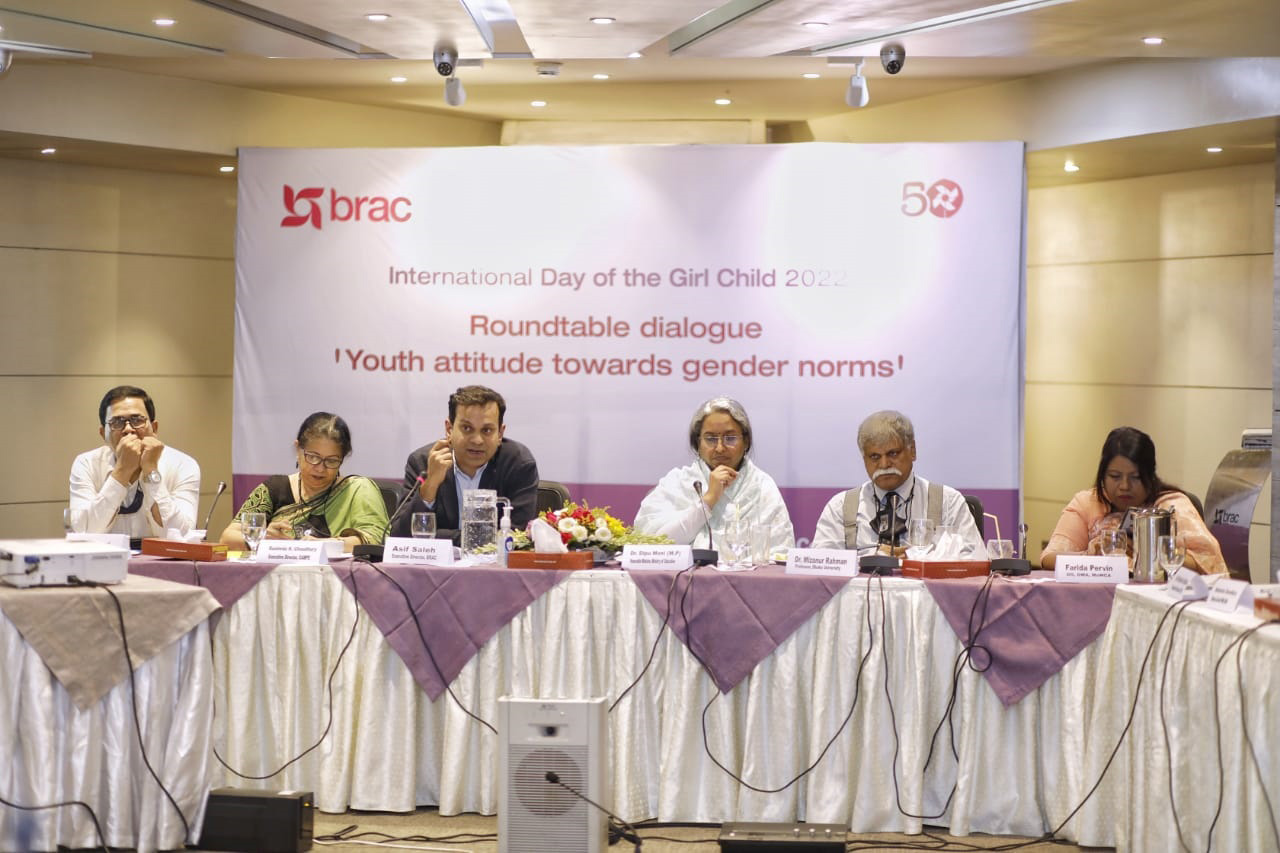
Experts, activists call for stronger collaboration to transform gender stereotypes
“We have a force in our country that is vehemently against gender equality. In Bangladesh, women have indeed achieved much progress, but they will still have to go a long way. But their journey is fraught with many hurdles. They will have to reach that state where they will claim their right to make decisions about their own life. It’s the family who has to stand beside their women and children in their fight to progress in life, but in our society our families are ridden with patriarchal values. We have to relentlessly work to transform this value system,” said Dr. Dipu Moni, minister for education and lawmaker, at a roundtable discussion today, Monday, 10 October 2022 organised at BRAC Centre in the capital.
BRAC organised the event on the occasion of International Girl Child Day to be observed tomorrow. The education minister was present at the event titled “International Girl Child Day dialogue on ‘Youth attitude towards gender norms’” as the chief guest. Asif Saleh, executive director, BRAC, chaired the programme.
The youths of Bangladesh, popularly termed as ‘population dividend’, currently make up more than half the population of the country and as such are the prime actors, sometimes prime victims also, in terms of the country’s scenario of gender equity and gender-based violence.
Recognising this crucial role of the youth, BRAC conducted a study on the youth perception towards gender norms in Bangladesh and shared the findings of the study at an event.
Special guests were Rasheda K. Choudhury, former adviser to Caretaker Government and present executive director, Campaign for Popular Education (CAMPE); Farida Pervin, director general, Department of Women Affairs, Ministry of Women and Child Affairs; Professor Nehal Ahmed, director general, Directorate of Secondary and Higher Education, Ministry of Education; Professor Dr. Mahjabeen Haque, Department of Educational and Counselling Psychology, Dhaka University; Professor Dr. Mizanur Rahman, former chairman of Bangladesh Human Rights Commission and at present teaching at Dhaka University; Dr. Fahmida Khatun, executive director, Center for Policy Dialogue (CPD); Syeda Rizwana Hasan, executive director, Bangladesh Environment Lawyers’ Association (BELA); and Korvi Raksand, founder, Jaago Foundation. KAM Morshed, senior director, Advocacy, Innovation & MEAL, BRAC, also spoke at the event. Nobonita Chowdhury, director, Gender Justice and Diversity, and Preventing Violence against Women Initiative, BRAC, moderated the dialogue.
Professor Dr. Mahjabeen Haque, Dr. Mohammad Salim Chowdhury and Dr. Md Azharul Islam jointly conducted the study titled “Exploring attitude towards gender norms among the youth population in Bangladesh”, the findings of which were shared at the dialogue by Dr. Mahjabeen Haque. The study was conducted among 2,790 men and women of age group 18-35 years, with around 50% male-female participant ratio, from altogether eight districts covering eight divisions.
Overall, the findings reflected a deeply rooted psyche favouring male control and male supremacy among the participants. Some of these responses are:
- 75% believe a wife needs not earn if her husband earns enough to run the household;
- 82% believe girls should not speak loudly;
- 73% think the male has the final say for large family expenses;
- 62% believe that it’s the girl’s family that should have the final say whether she should have higher education or not;
- Participants who went to Madrasa showed less sensitivity to gender-equal lens than those who went to Bengali medium institutions.
CAMPE director Rasheda K Chowdhury said, “Bringing overnight change in the youth psyche is not possible. It will take time. Also we have to bring changes in the education curriculum to reflect the national achievement of our women. We have to read about Nishat Mazumder also besides Tenzing Norgay and Edmund Hillary as the celebrated climber of Mt Everest.”
Former BHRC chair Professor Mizanur Rahman said, “If the rule of law is weak in ensuring equity in other areas of life such as distribution of wealth it will never help in achieving gender equity. Investment has to be made in education to promote gender equality among the young population. Involvement of any religious institutions to promote domestic violence is a despicable act and a violation of human rights.”
DG for Directorate of Secondary and Higher Education Professor Nehal Ahmed said, “We have taken initiatives to bring changes in the curriculum promoting gender equality learning for students. We hope the new curriculum will positively contribute in transforming gender norms among the young population.”
Department of Women Affairs DG Farida Pervin said, “The ministry of women and children affairs is working towards the empowerment of women with a focus on social and behaviour change communication. The ministry operates over 6,000 adolescent clubs down to the union level each of which have 20 girls and 10 boys as members. The government also launched the Joy mobile app with an aim to help women and children in emergency situations whenever they face violence.”
Jaago Foundation founder Korvi Raksand said, “Gender stereotyping starts at a very young age when girls are bought dolls and boys are bought guns. So it’s not an easy task to change the mindset of the youth. It’s important to focus on primary education and involvement of parents too.”
CPD ED Dr Fahmida Khatun said, “A large number of women who earn an income do so from working in the informal economy. We must consider how to bring women from informal to formal sectors. Education, skills and access to finance are important factors to ensure that women go ahead in life.”
BELA ED Syeda Rizwana Hasan said, “I believe we have an inner sense of respect for women but we could not nurture it. The state must take an initiative to cultivate a culture which promotes respect for women and gender equality.”
BRAC ED Asif Saleh said, “Bringing change would need us to work with those who can deliver the learning. We need to work with the cultural, media and publishing sectors. Moving towards gender equality is essentially a political and power struggle. Even if there has been a change in political commitment, there is a need for norm change. This is why we have planned to create a movement called shomotontro, (a system of equality) where we want to involve leaders from all sectors. We have to work towards solving the practical realities of why women don’t get involved in professional activities.”
The 2022 Aga Khan Award for Architecture honours Community spaces in the Rohingya refugee response
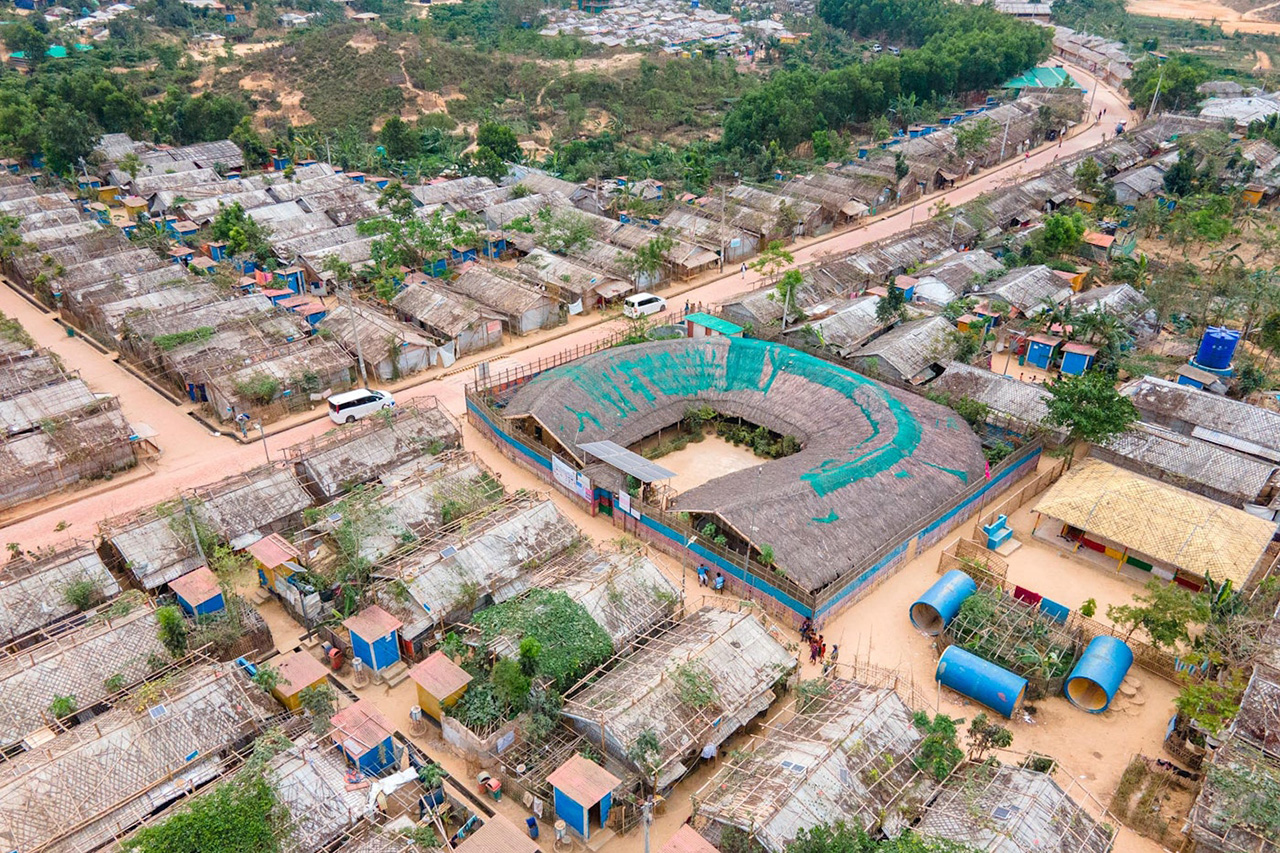
A BRAC and ActionAid in Bangladesh initiative
One of the six winners of the 2022 Aga Khan Award for Architecture is Community Spaces in the Rohingya Refugee Response, a programme created through a partnership between BRAC and ActionAid to design dignified space for the Rohingya refugees based on their culture, craftsmanship and identity. Located in Cox’s Bazar, Bangladesh, in the world’s largest refugee camps, the spaces are a collective of six sustainably built structures that evolved collaboratively in the field without drawings or models. The process was led by architects Khwaja Fatmi, Rizvi Hassan and Saad Ben Mostafa, working in close cooperation with women and girls of the Rohingya community. It reflects BRAC’s commitment to unlocking the potential of people and communities, frontline pragmatism, frugal innovation, and engaging women as catalysts of change.
The six spaces are part of a massive response to the forced displacement of almost one million Rohingyas from Myanmar to Bangladesh in August 2017. That displacement left the community feeling like a ship without an anchor. The loss of homes and possessions, the temporary living arrangements in makeshift shelters and the denial of nationality imprinted a sense of dissociation and a loss of any feeling of safety. As time went on, and dependence on aid increased, the sense of loss grew, and the effects were disproportionately felt by women and girls.
Amid the congested shelters, community spaces were needed where women and girls could access support networks, strengthen social relationships, learn and share skills, and find peace. Vital was the participation of women and girls in the design who would use the resulting spaces.
The spaces that evolved are female-friendly, low to the ground to withstand cyclones, and recognizable for their complex roof trusses built by Rohingya bamboo workers. The exteriors are designed to avoid disturbing visiting elephants.
The Award’s master jury citation calls the spaces an “ingenious response to emergency needs related to the major influx of Rohingya refugees into Bangladeshi host communities, with particular attention to the safety of women and girls.” It adds: “The concept and design of the six spaces are the result of appropriate planning, solid partnerships and inclusive processes involving the diverse refugee and host communities, such as defining spatial and functional needs. The project’s implementation succeeded in adapting to various constraints (physical, social, regulatory, budgetary, climatic and environmental) and harsh working conditions, and harnessing the skills of workers and artists – women and men from refugee and host communities – for both construction and decoration, drawing from a variety of Rohingya and Bangladeshi construction techniques, spatial and architectural features, ways of life and aesthetic references.”
The design process began with a focus group discussion led by the architects involving mostly Rohingya women. The discussion identified needs to be met by the structures – and how they could best be addressed. Construction used locally available materials such as bamboo, straw, and tarpaulin. The building of the spaces was led mostly by Rohingya men, many of whom are expertly skilled at woodwork and building with bamboo. The interior decoration was led mostly by Rohingya girls and women, who covered the structure with vibrant artwork and colours that continue to be expanded by other girls and women using the space.
The Aga Khan Award for Architecture is given every three years to projects that set new standards of excellence in architecture, planning practices, historic preservation and landscape architecture. The Award seeks to identify and encourage building concepts that successfully address the needs and aspirations of societies across the world, in which Muslims have a significant presence.
Workshop reintroduces GO-NGO Collaboration Platform

Right targeting must to shun resource misuse
Social safety net programmes design should have components to assist people to learn skills for income generation to become self-dependent, which will help them reduce their dependence gradually on safety net assistance. Also targeting the right people for receiving safety net assistance is a must for proper utilisation of the public funding. The social security system in Bangladesh, however, deals with errors of exclusion (failure to reach the needy) and errors of inclusion (providing aid to the non-needy), which leads to misplacement of resources.
These observations were drawn at the “Workshop on GO-NGO collaboration platform for strengthening social protection programmes” today on Sunday (25 September) at Hotel Intercontinental in Dhaka. Jointly organised by BRAC and the Cabinet Division of Bangladesh, the event had Shamsul Arefin, secretary (coordination and reform), Cabinet Division, as chief guest.
KAM Morshed, senior director, BRAC, Mohammad Khaled Hasan, joint secretary, Cabinet Division, Tapan Kumar Biswas, director, NGO Affairs Bureau, other government officials from different ministries, and representatives of 17 member NGOs of the GO-NGO Collaboration Platform were also present at the workshop.
In his opening remarks, BRAC senior director KAM Morshed said, “Despite its beginning with full vigour in 2018-19, the GO-NGO Collaboration Platform lost its momentum due to Covid induced lockdown. Through today’s workshop, we are trying to reintroduce the activities of the forum.”
“The government spends 2.55 percent of the GDP on social safety net programmes. However, in rapidly progressing countries like Bangladesh, a segment of the population in remote places usually fall behind. NGOs work for them, with them. This aligns with the SDG commitment of ‘leaving no-one behind’ and poverty alleviation,” he further said.
Cabinet secretary for coordination and reform Shamsul Arefin in his chief guest’s remarks said, “Article 15, Clause D of Bangladesh Constitution deals with the vision of creating a country free of poverty, hunger and exploitation. In 2015 the government formulated the National Social Security Strategy for the poor and marginalised.”
He further said, “We cannot achieve the goal without building consensus with NGOs, who have been the most essential partners of the government. They are complimenting the government in its struggle to eradicate poverty. The cabinet division has taken initiatives to institutionalise GO-NGO Collaboration Platform and deeply appreciates the support from BRAC.”
Joint secretary Mohammad Khaled Hasan discussed the scopes of collaboration between the government and development organisations. “A combination of social safety net and social security ladder provides both capital and training, thus the recipients utilise their resources to never fall back to the cycle of poverty,” Khaled said.
Participants in the workshop engaged in a dialogue to identify areas where NGOs can play the role of associate or subsidiary to the government. NGOs can play a key role in monitoring and evaluation and by taking the information and data gathered from the grassroots to policymakers, they observed. A key discussion also took place on “better targeting” to avoid misplacement of assistance.
To facilitate the mechanism of the social safety net in Bangladesh, the GO-NGO Collaboration Platform was introduced, with BRAC as the lead NGO. Thirteen representatives from ministries and agencies implementing social security programmes and 17 NGOs working on social security issues are part of the platform.
BRAC launches floating boats for play-based education

To celebrate the golden jubilee of BRAC – one of the world’s largest non-governmental organisations, BRAC today on Saturday, 17 September launched an exciting initiative in Sunamganj district to bring play-based and experiential learning for children through floating boats. The ceremony took place at the Upazila Parishad Auditorium in Bishwambharpur Upazila with great festivities and celebrations.
The event was attended by, among others MD Jahangir Alam, District Education Officer, Sunamganj; Mahamudul Hasan, Assistant Upazila Education Officer, Bishwambharpur; Badal Chandra Barman, District Children Affairs Officer, Sunamganj; MD. Safar Uddin, Upazila Chairman, Bishwambharpur. Safi Rahman Khan, Director, Education, Skills Development, and Migration; and Profulla Chandra Barman, Programme Head, Education Programme; were present from BRAC.
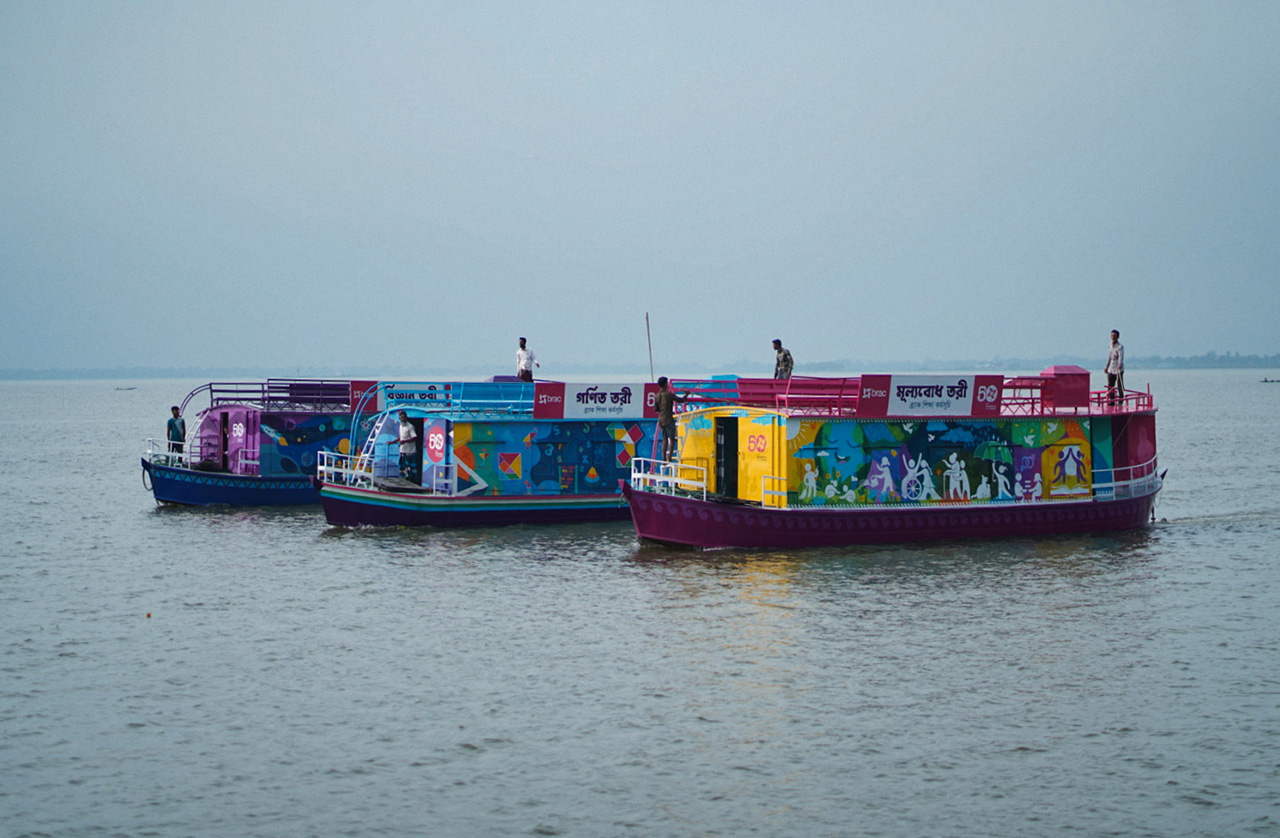
Thematically designed around mathematics, science, and values – the three boats will travel a long water route stretching from Sunamganj in the northeast to Bhola Island in the south bordering the Bay of Bengal. They will make stopovers en route where a wide range of children, students, teachers and people from the community can visit and experience the travelling exhibits along with activities. The duration of stopovers will be for 7-10 days from 10am-4pm. The boats will draw volunteer teachers from the local communities to guide visitors. Special ramps have been designed for children with disabilities.
Md Safar Uddin, Upazila Chairman of Bishwambharpur said, “BRAC boat school initiative of 2011 gave access to education to the deprived children of the haor areas. Education should be brought to the doorsteps of children and hence BRAC should reintroduce more boat schools to provide education to the disadvantaged children of haor areas.”
Safi Rahman Khan, Director, Education, Skills Development, and Migration said, “The inherent beauty and magic of math can at times be hard to see, and even harder to explain to students. Through experiential learning, play based and hands-on activities, children will hopefully enjoy and not fear math.”
The educational activities and materials have been particularly designed for primary school children, although older students and visitors will also be able to experience the joy of learning. The visitors will be offered activities and contents on values, while subjects on maths and science are designed with puzzles, hands-on experiments, problem solving with fun activities and games, and photographic introduction to great scientists and mathematicians.
The Values Boat was inspired by the philosophy of Sir Fazle Hasan Abed, founder of BRAC, who ensured that along with regular academic subjects, value education and performing fine arts are incorporated in BRAC schools.
All the boats will be covered under CCTV surveillance and will strictly follow BRAC’s safeguarding policies along with the health, safety and security guidelines.
BRAC had introduced the boat schools in the wetlands (haor regions) of north-eastern Bangladesh in 2011. The idea was to bring the classroom to the children who were deprived from accessing education living in the haors. The Boat School project was selected as “100 Global Inspiring Innovations of 2017” list by HundrED, a Finnish global education non-profit organisation.
As the largest development collaborator of the government, BRAC has been undertaking and scaling up innovative learning initiatives for this along with other difficult-to-access regions.
BRAC, Mongla Port Municipality launch town development project
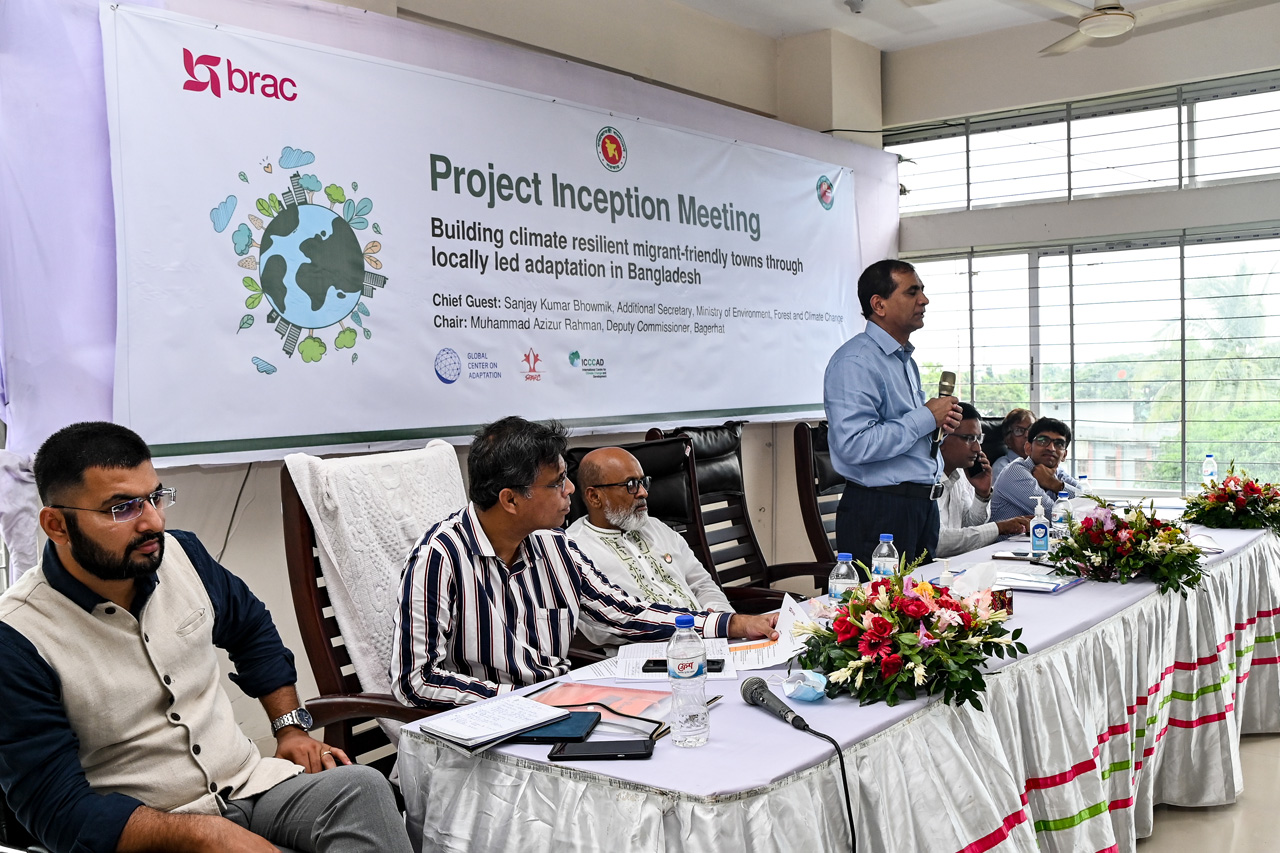
Climate-resilient migrant-friendly town development urgent
Through locally-led adaptations
Bangladesh is globally recognised as a role model in tackling climate change impacts with sustainable solutions. The district of Bagerhat, especially its Mongla upazila, gets special importance in the climate adaptation initiatives of the government. It’s particularly so because the preservation and development of Sundarbans, a world heritage site situated in this region, means the development of the whole world.
This observation came from Sanjay Kumar Bhowmik, additional secretary, Ministry of Environment, Forest and Climate Change, while he spoke as chief guest at the inception meeting of a project titled ‘Building climate resilient migrant-friendly towns through locally-led adaptation in Bangladesh’.
Development organisation BRAC and Mongla Port Municipality jointly organised the programme today on Monday (05 September 2022) at the Upazila Muktijoddha Complex in Mongla Port Municipality town.
The project will be implemented in a consortium of BRAC, International Centre for Climate Change and Development (ICCCAD) and technology service company Spark India. BRAC will be in charge of its overall implementation, while ICCCAD and Spark India will be technical and knowledge partners. Mongla Port Municipality will lead the implementation of the pilot in its township. The project has been undertaken with a view to strengthen the process of building climate-resilient migrant-friendly urban centres in Bangladesh. The programme will be replicated in three more urban centres by 2026 and in 26 more such areas by 2030.
Kamalesh Majumder, upazila nirbahi officer, said in his special guest’s speech, it is important to implement various projects by prioritising the needs of climate-vulnerable people. The main problem of Mongla city is the lack of safe drinking water. Increased salinity increased various health risks. It’s urgent to identify and solve the main problems in a sustainable manner.
Bir Muktijodha Sheikh Abdur Rahman, mayor, Mongla Port Municipal, and a special guest at the event, said that the coastal region especially Mongla Port Municipality is one of the most climate-vulnerable areas of Bangladesh. Ensuring safe water supply in this area is essential to combat climate risks. Also, sustainable measures should be undertaken to provide necessary facilities for climate migrants.
Dr. Md Liakath Ali, director, Climate Change Programme, BRAC & BRAC International, and Urban Development Programme, BRAC, in his chair’s speech said, this project is being implemented for the first time in Asia, funded by the Global Center on Adaptation (GCA). Climate change Programme and urban development Programme are closely related. The project will be worthwhile if the real needs of the climate migrants living in Mongla are identified and mitigated through appropriate measures.
At the meeting, BRAC Urban Development Programme’s programme head Imamul Azam Shahi presented details about the project, while Climate Change Programme’s programme head Abu Sadat Moniruzzaman Khan gave welcome speech. SPARK India official Nihar Johori presented a brief on mobilisation model for the development of low-income communities at risk of climate change. Savio Rozario from ICCCAD spoke on vulnerability, risk assessment and climate adaptation planning processes.
Md Hafiz-al-Asad, additional deputy commissioner (revenue), Bagerhat, educationists, journalists and dignitaries were also present on the occasion.
The project will provide support to climate migrants especially women, children, youth and citizens with disabilities to enhance skills, job opportunities, income generation, financial inclusion and social security opportunities.
Join the world’s biggest family

